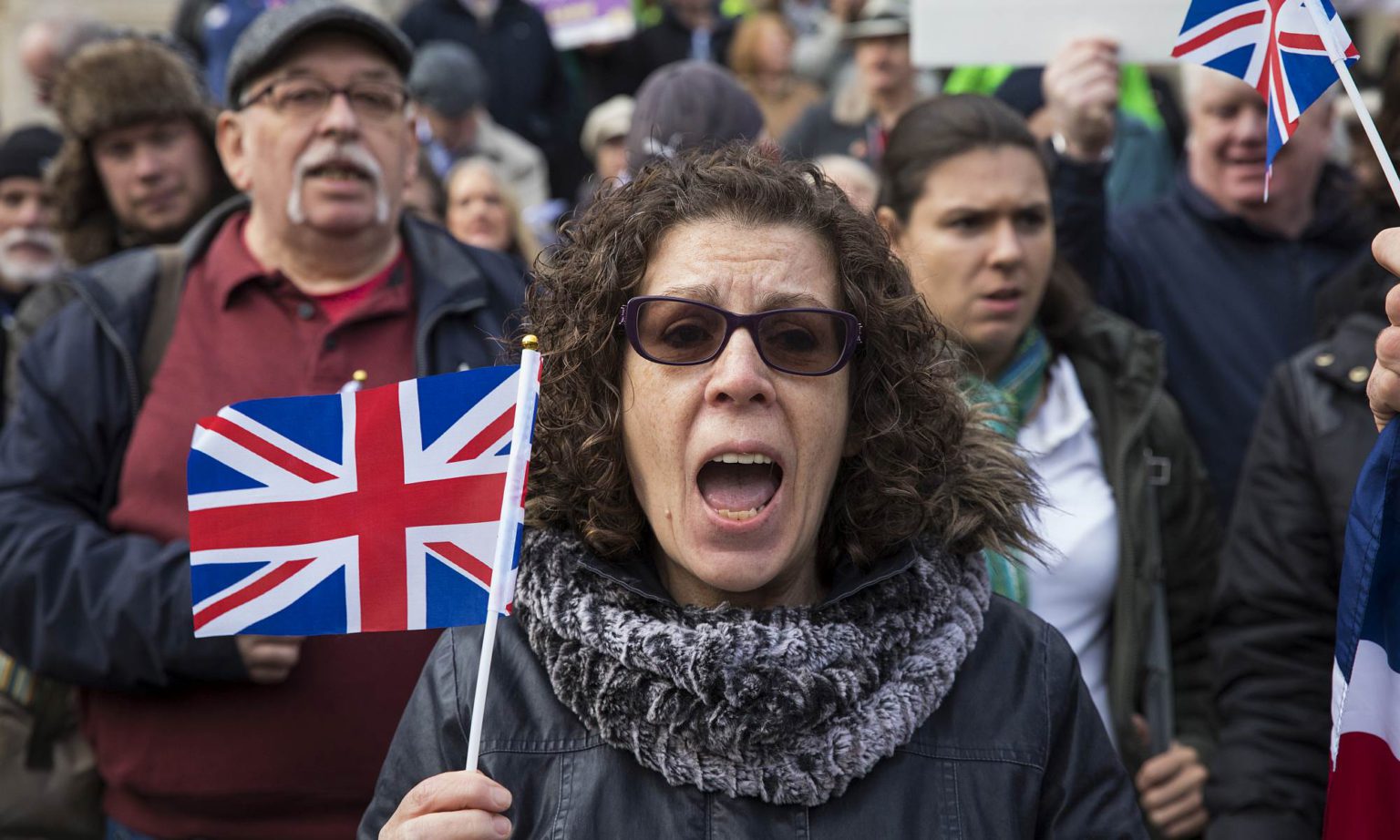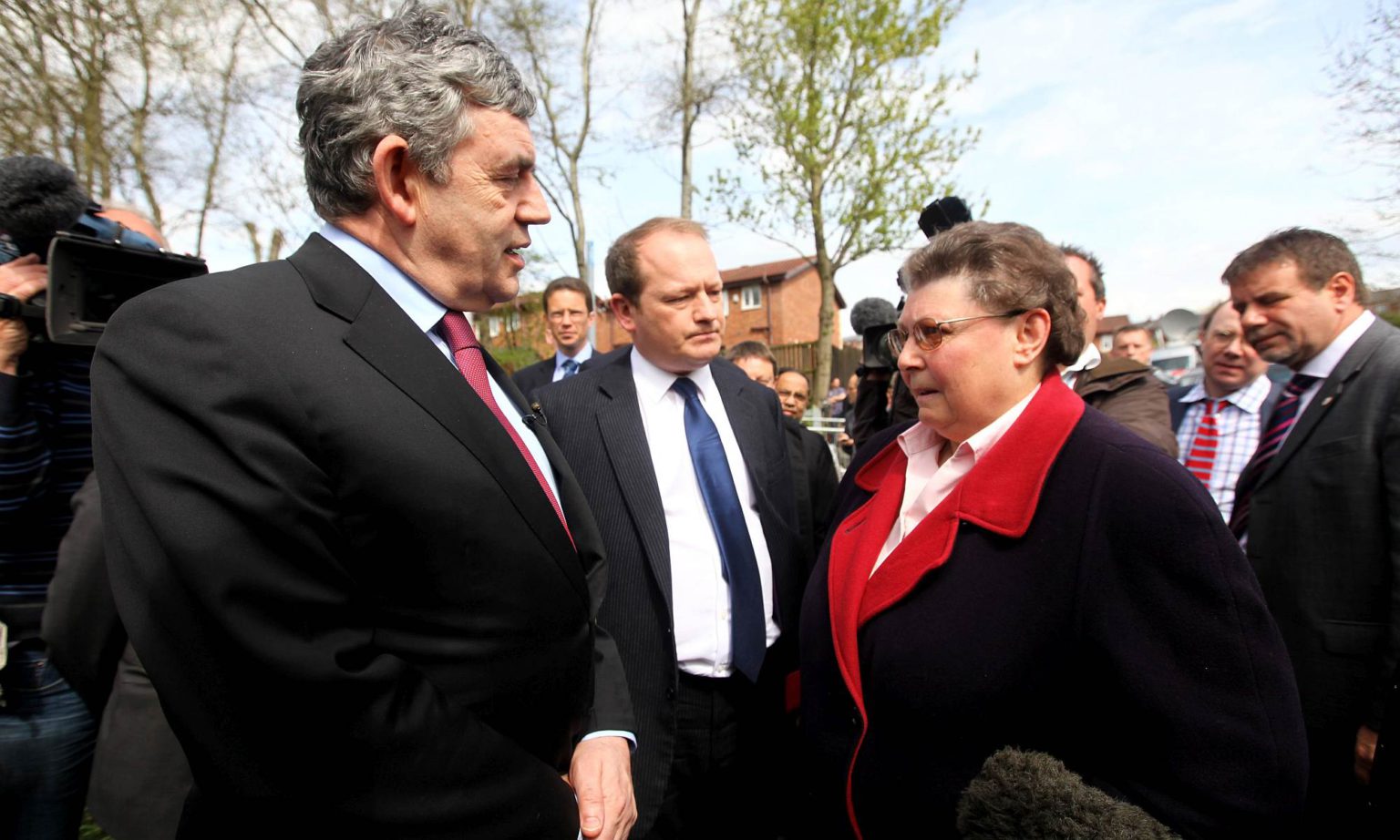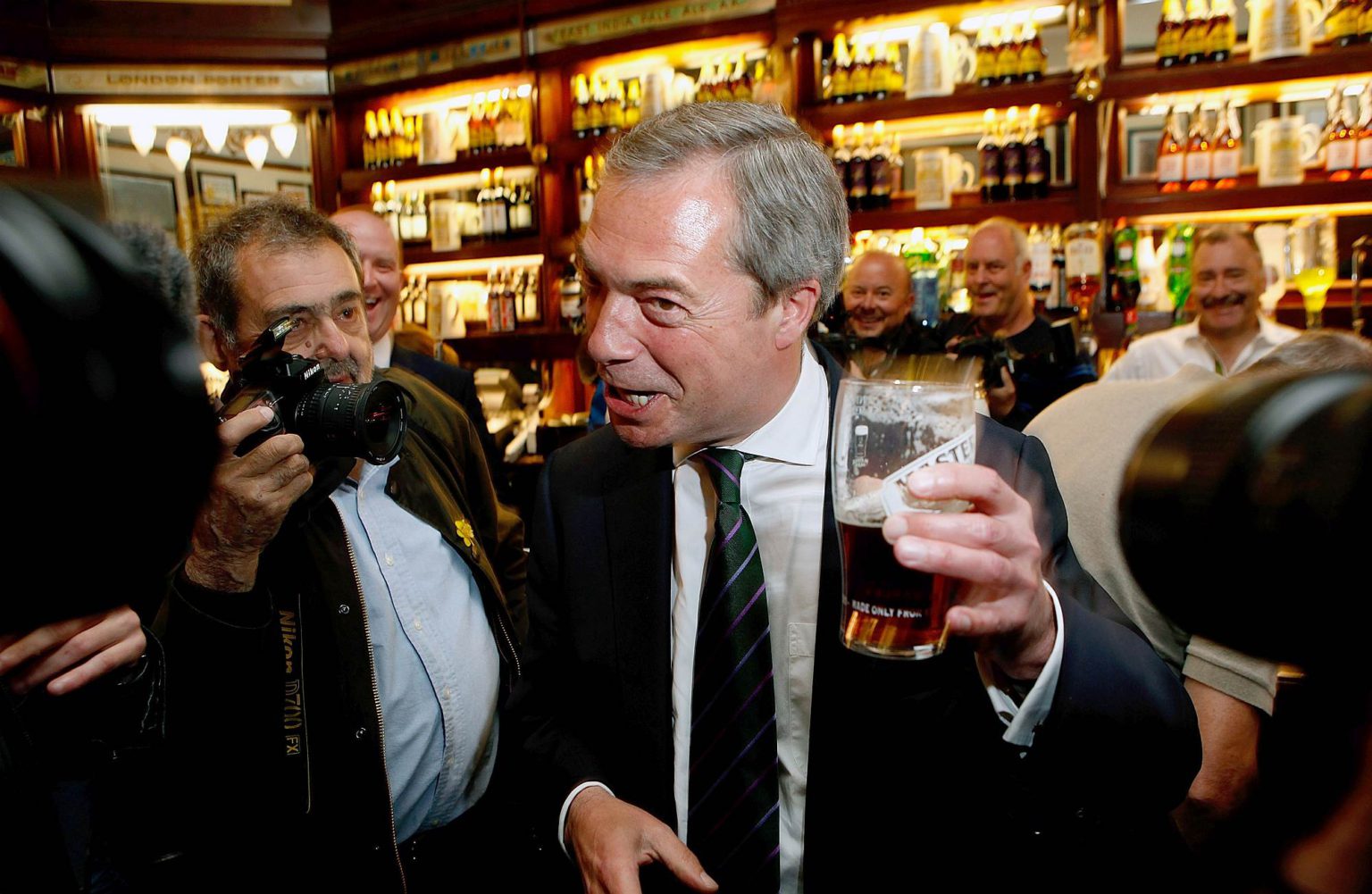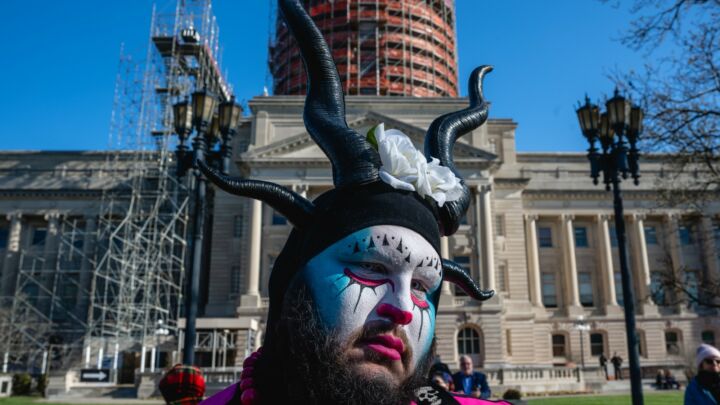
Long-read
The People’s Decade
From Gillian Duffy to the Boris revolt — this is the decade in which the silent majority fought back.
So the 2010s have come to an end. And what a curious and enlivening decade it has been. Decades are rarely neat political categories. The Sixties, as a phenomenon, didn’t really start until 1963. The Eighties are misremembered as an era of free-market triumphalism, overlooking that PC, cultural relativism, post-colonial guilt and the end of the Cold War that had provided the West with a sliver of moral purpose all took place in that tumultuous decade, giving rise to years of Western self-doubt, even self-hatred, rather than the Thatcherite cockiness that historical illiterates see as the Eighties’ ongoing political ripple.
But the 2010s — this decade does feel neat. It feels like it has a story, an arc, in the British context at least. For this is the decade that begins with Gordon Brown insulting a northern working-class Labour voter as a ‘bigot’ and ends with the northern working classes revolting against Labour in their hundreds of thousands. It begins with the Gillian Duffy crisis, when Brown unwittingly exposed his increasingly middle-class party’s contempt for the lower orders by being overheard referring to this 65-year-old lady from Rochdale as a ‘bigoted woman’, and it ends with the mass switching of traditional ‘red wall’ Labour voters to Boris Johnson’s Conservative Party — and, by extension, to Labour’s worst drubbing at the polls since 1935.
From Gillian Duffy to the Brexit / Boris votes: if the 2010s tell a story, it is one of a peaceful, understated working-class revolt. Of ordinary people pushing back against elites that had come to view them as bigots. Of the long sneered-at and interfered-with and re-educated sections of the public rising up against their so-called betters and restating the case for national sovereignty and community values. Of the people reprimanding the powers-that-be and forcing them, via the ballot box, to respect the people’s will and the people themselves.
This has been a thoroughly democratic decade. The People’s Decade, in fact, in which democracy has done what democracy is meant to do: marshalled the wisdom of the crowd to correct the jaundiced, elitist, anti-democratic drift of the governing classes.
The People’s Decade really begins in April 2010. It was 28 April and Gordon Brown, gearing up for the General Election, was on a walkabout in Rochdale. This was Brown’s first General Election as prime minister, his having received the crown of PM from Tony Blair in 2007, in a stitched-up, court-like manner befitting of the New Labour machine. Gillian Duffy, a lifelong Labour voter and former council worker, was also out in Rochdale that day. She was buying a loaf of bread. Her path crossed with Brown’s, in front of TV-news cameras, and in that very moment Brown’s fate, his destiny as a shortlived and unpopular PM, was sealed.
Duffy asked Brown about various things. She asked him about the public debt and how he proposed to fix it. She asked about the decline of university grants and how her grandkids were expected to be able to go to Uni. She asked him about health and welfare. And she asked him about immigration. ‘You can’t say anything about the immigrants’, she said, wisely sensing that even raising this issue could see you branded a bigot. ‘These Eastern Europeans’, she said, ‘where are they flocking from?’. Brown smiled and said something jovial and even patted Mrs Duffy on the back, but really he was horrified by what she had said. As the nation would discover just moments later.

Unbeknownst to Brown, a Sky News mic attached to his lapel was still on. When he got back to his car he berated one of his aides. He demanded to know why they had put him on air with ‘that woman’, as he referred to Mrs Duffy. Asked by the aide what the woman had said, Brown replied: ‘Oh everything. She was just a sort of bigoted woman. She said she used to be Labour. I mean it’s just ridiculous.’ That woman. That bigoted woman. Words heard by everyone. Words replayed endlessly in the run-up to the election. The fallout was enormous.
It became, in many ways, the Gillian Duffy election. Brown went on a mea culpa media tour. He expressed contrition on radio shows. He apologised to Duffy in person. He started to wear that browbeaten look that has since become his everyday face. ‘I am a penitent sinner’, he said in one interview. He wrote an astonishingly contrite letter to Labour Party members, acknowledging that his insulting of Duffy had made their task of re-election far harder. It was all to no avail. Bigotgate overshadowed everything Brown said and did. It was held up as ‘an illustration of the way that Labour had lost touch with the concerns of the working classes’. It was proof, as one observer said, that Labour was ‘blind to public concern about immigration’. Duffy vs Brown has ‘torpedoed’ Labour’s election campaign, the Guardian declared. Sure enough, just over a week later, on 6 May 2010, Brown’s Labour Party lost 97 seats, winning just 258. David Cameron’s Conservative Party got the most seats, but not enough to form a government, hence we had five years of the Tory / Lib Dem coalition.
The Gillian Duffy affair, the start of this People’s Decade, was fascinating on many levels. Fundamentally, it revealed the schism in values and language that separated the elites from ordinary people. To the professional middle classes who by that point — after 13 years of New Labour government — had conquered the Labour Party, people like Mrs Duffy were virtually an alien species, and places like Rochdale were almost another planet. Indeed, one small but striking thing that happened in the Duffy / Brown fallout was a correction published in the Guardian. One of that newspaper’s initial reports on the Duffy affair had said that Rochdale was ‘a few hundred miles’ from London. Readers wrote in to point out that it is only 170 miles from London. To the chattering classes, it was clear that Rochdale was as faraway and as foreign as Italy or Germany. More so, in fact.
The linguistic chasm between Duffy and Brown spoke volumes about Labour’s turn away from its traditional working-class base. Yes, there was the word ‘bigot’, but, strikingly, that wasn’t the word that most offended Mrs Duffy. No, she was most horrified by Brown’s description of her as ‘that woman’. ‘The thing that upset me was the way he said “that woman”’, she said. ‘I come from the north and when you say “that woman”, it’s really not very nice. Why couldn’t he have just said “that lady”?’
One reason Brown probably didn’t say ‘lady’ is because in the starched, aloof, technocratic world New Labour inhabited, and helped to create, the word ‘lady’ had all but been banned as archaic and offensive in the early 2000s. Since the millennium, various public-sector bodies had made moves to prevent people from saying lady to refer to a woman. One college advised against using the word lady, as it is ‘no longer appropriate in the new century’. An NHS Trust instructed its workers that ‘lady’ is ‘not universally accepted’ and should thus be avoided. In saying ‘that woman’, Brown was unquestionably being dismissive — ‘that piece of trash’ is what he really meant — but he was also speaking in the clipped, watchful, PC tones of an elite that might have only been 170 miles from Rochdale (take note, Guardian) but which was in another world entirely in terms of values, outlook, culture and language.
‘I’m not “that woman”’, said Duffy, and in many ways this became the rebellious cry of the People’s Decade. She was pushing back against the elite’s denigration of her. Against its denigration of her identity (as a lady), of her right to express herself publicly (‘it’s just ridiculous’, as Brown said of that very public encounter), and most importantly of her concerns, in particular on the issue of immigration and its relationship to the welfare state.
The Brown-Duffy stand-off at the start of the People’s Decade exposed the colossal clash of values that existed between the new political oligarchy represented by Brown, Blair and other New Labour / New Conservative machine politicians and the working-class heartlands of the country. To Duffy and millions of other people, the relationship between welfare and nationhood was of critical importance. That is fundamentally what she collared Brown about. There are ‘too many people now who are not vulnerable but they can claim [welfare]’, she said, before asking about immigration. Her suggestion, her focus on the issue of health, education and welfare and the question of who has access to these things and why, was a statement about citizenship, and about the role of welfare as a benefit of citizenship. But to Brown, as to virtually the entire political class, it was just bigotry. Concern about community, nationhood and the impact of immigration is just xenophobic Little Englandism in the minds of the new elites. This was the key achievement of 13 years of New Labour’s censorious, technocratic and highly middle-class rule — the reduction of fealty to the nation to a species of bigotry.
The Brown-Duffy stand-off exposed the colossal clash of values that existed between the new political oligarchy and Britain's working-class heartlands
One of the most important things about the Brown-Duffy affair, looking back at it today, is that it reminds us that the rot set into Labour long before Jeremy Corbyn became leader in 2015. Following Labour’s historic defeat in the General Election this month, it’s been knives out for Corbyn. Much of this is understandable. Corbyn’s ‘woking’ of the Labour Party, his embrace of eccentric identitarian causes, his betrayal of his own Eurosceptic beliefs, and his association with anti-Semitic, anti-Western causes have all made him unpalatable and unelectable in the eyes of many working-class voters. But for New Labour grandees and New Labour supporters to argue that the way to win back the ‘red wall’ defectors to Boris is by returning to the Blairite path is ridiculous. As the Brown-Duffy affair reminds us, Labour’s loss of its traditional support started back when Corbyn was just a mischief-making backbencher.
Labour has been losing working-class support for decades. In their book British Political Parties Today, Robert Garner and Richard Kelly argued that, over the past few decades, ‘the most striking feature of voting behaviour was the working-class desertion of Labour’. In 1966, 69 per cent of manual workers voted Labour. That percentage fell through the 1970s and 80s, until by 1987 only 45 per cent of manual workers voted Labour. The largest desertion was among skilled manual workers. In the 1950s, around 60 per cent of skilled workers supported Labour; by the mid-1980s only 34 per cent did. At the end of the 1980s, already, the academic Ivor Crewe could argue that ‘Labour’s claim to be the party of the working class [is] sociologically, if not ideologically, threadbare’.
There was a return of working-class voters during the Blairite buzz of the early New Labour years but, strikingly, it didn’t last. Fifty-eight per cent of working-class voters went for Blair’s New Labour in 1997. In 2005, however, when Labour won its third victory but with a reduced majority, it was mainly working-class voters who had withdrawn their support. Only around two per cent of Labour voters in the professional AB classes refused to vote Labour in 2005, while in social classes C1, C2 and DE around 20 per cent of those who had voted Labour in 2001 didn’t vote for it in 2005.
Labour was being sustained by the middle classes. Indeed, Labour has become a thoroughly middle-class party, in terms of structure, leadership, membership and, increasingly, electoral support. As The Economist described it last year, Blair and Brown oversaw the transition of Labour into a ‘party of the professional middle class — that is, university-educated people who worked with their brains rather than their hands and embraced the double liberalism of free markets and progressive morals’. The party’s apparatus was, in the words of The Economist, ‘taken over by identikit professional politicians who had been to the same universities (often Harvard as well as Oxford) and worked for the same think-tanks’. These ‘freeze-dried specimens’ now dominate every layer of Labour, says The Economist.
The end result is a Labour Party whose proportion of working-class MPs fell dramatically — from 37 per cent in 1951 to 13 per cent in 1997. And today, according to a study by Royal Holloway University, just seven per cent of Labour MPs come from a ‘manual background tradition’. There are now more MPs who have studied PPE at Oxford than have ever muddied their hands in a working-class profession.
It is not a mystery as to why New Labour turned off working-class voters. New Labour’s guiding ideology, its central motto, was to celebrate flux over tradition, global institutions over national integrity, and the top-down unilateral refashioning of cultural values over the cultural anchors that had steadied communities for decades. It was summed up by Blair in his party conference speech in 2005: ‘The character of this changing world is indifferent to tradition. Unforgiving of frailty. No respecter of past reputations. It has no custom and practice. It is replete with opportunities, but they only go to those swift to adapt, slow to complain, open, willing and able to change.’
Indifferent to tradition. No custom, no practice. Swift to adapt. These were the credos of Blairism. It is hard to think of a more polar opposite worldview to that held by communities in which people like Mrs Duffy live. There, tradition is valued. Custom is important. Cultural security and a sense of belonging are celebrated. To these communities, Blair’s arrogant applauding of globalisation and its indifference to your life, your culture and your prospects was nothing short of horrendous. The Blairites essentially celebrated cultural insecurity and then sought to mend the inevitable social problems caused by such cultural insecurity through nurturing a therapeutic state — the stakeholders’ society, their regime to control anti-social behaviour, nanny statism, censorship, and so on. But to Labour’s traditional working-class voters, cultural security, knowing you belong somewhere and belong there for a reason, was of critical importance. No, not because these people are old-fashioned or unchanging, but because they know the value and necessity of solidarity.
New Labour’s embrace of liberal cosmopolitanism ran counter to the traditions of work, solidarity and citizenship that defined the party’s traditional voting base. As Jonathan Rutherford has argued, progressive politics in the 1990s and 2000s shifted away from old notions of ‘membership that makes a claim on people’s loyalty’. Leftists came to view ‘the particularist loyalties of the nation state and inherited national customs and traditions’ as problematic because they ‘divided individuals from their shared humanity’. They ‘delegitimised English culture’, in particular, ‘as imperialist and racist, and by default those who value it’.
That is, New Labour’s sanctification of flux, its mockery of tradition, its embrace of the vagaries of globalisation, informed and emboldened a broader elitist attempt to re-educate voters away from the ideals of national loyalty and community solidarity and towards a worldview in which custom and practice do not exist but where there are numerous opportunities (if you are young, disconnected, quick to adapt, and slow to complain). And according to Blair, there was no point even debating globalisation. It was an unstoppable force. ‘You might as well debate whether autumn should follow summer’, he said, signalling the fatalist and anti-democratic nature of the new global technocracy.
Strikingly, New Labour’s embrace of mass immigration was fuelled by this same ideological indifference to tradition and the instinct to transform the UK from a nation state into merely a member state of the new globalist order — in particular, of course, of the European Union. As a Labour government adviser revealed at the end of 2009, there was an express political intent to New Labour’s decision to ‘open up the UK to mass migration’. There was a ‘driving political purpose’ — which was to make manifest New Labour’s goal of a ‘truly multicultural society’ and to allow government officials to ‘rub the right’s nose in diversity and render their arguments out of date’.

In essence, mass immigration became a tool of political and social engineering. The aim was less to bring in migrants who were required to do certain forms of work, but rather to use migration as a means of underlining Blair’s brave new world of post-nationhood, indifference to tradition, and valuation of difference over citizenship and multiculture over British culture. Over time, anybody who questioned any of this, who stood up for the values of democratic solidarity, would find themselves denounced as a bigot. After all, part of the aim, as the government adviser confirmed, was to render such arguments ‘out of date’.
This is the setting in which Mrs Duffy and Mr Brown met at the start of this decade. Indeed, their clash was a distillation of the broader culture clash that existed between the new oligarchy and the people. On one side, a questioning of mass immigration and an expression of concern for the welfare and culture of the nation, and, on the other, the sniffy denunciation of such commentary as ‘bigotry’ — unfit for public airing, unbecoming in our new globalised post-nation, and unacceptable in a world in which the Labour government had made great efforts to ‘render such arguments out of date’.
‘I’m not just “that woman”.’ Mrs Duffy spoke for many when she uttered those words. And she captured the essence of a decade in which there would be a conscious public fightback against the new elites. First under Ed Miliband and then even more so under Jeremy Corbyn, Labour actually intensified the trends of Blairism. This is the great irony of the Corbynistas’ supposed stand against Blairism, or Toryism, as they call it: in truth, they continued to pursue the Blairite project. They, too, embraced post-nationhood; they, too, backed the globalist project of the EU; they, too, sanctified individual self-realisation over community solidarity (though they fashioned it in identitarian terms rather than the pull-your-socks-up idea preferred by Blair); and they, too, denounced Labour’s traditional working-class supporters as ‘bigots’. Indeed, on this front they went even further than New Labour, frequently saying out loud what Brown only said when he thought he was off-air — that the country is full of uneducated, unenlightened xenophobes.
Blair celebrated the flux of neoliberalism; the Corbynistas celebrate the flux of neoliberalism as well as the flux of wokeness with its even more insidious assaults on family, community and even such basic community building blocks as sex, gender and reality. It is not surprising that working-class Labour voters revolted throughout the 2010s. Following the devastating result for Brown in May 2010, there came the poor showing for Ed Miliband in 2015. During this time, many working-class Labour voters defected to UKIP, then led by Nigel Farage. As Labour’s vote fell, UKIP’s rose. UKIP provided a home for many working-class people tired of the New Labour project and Blairite indifference to national values and cultural security.
So in the 2014 EU elections, UKIP came first, winning a staggering 4,376,635 votes. And in the 2015 General Election, it won 12.6 per cent of the vote — 3,881,099 votes. Many of its voters were people like Gillian Duffy. Indeed, in 2014, in a newspaper interview, Mrs Duffy said Labour needed a ‘straight-talking, pint-drinking leader’, like Farage.
These electoral revolts, in which large numbers of working-class voters defected to UKIP, were the first significant acts of popular pressure on the out-of-touch elites. They made it virtually essential to hold a referendum on EU membership. It is not a coincidence that when David Cameron stood on a platform of holding a referendum — in the 2015 General Election — he won the majority government that he failed to win in 2010. A year later, in 2016, the EU referendum took place, and the rest is history. The largest bloc of voters in the history of this country — a significant number of them from such sneered-at places as Rochdale — voted to leave the EU and break away from the globalisation dynamic whose instability and incoherence had been celebrated openly by the new elites, but which were viewed with concern and even contempt by vast numbers of ordinary people.
We all know what happened next. The elites launched the most reactionary campaign against the democratic will in living memory. They used every legal, parliamentary and propaganda tool at their disposal to demonise the electorate and delegitimise their vote. It made Brown’s off-air insult of Mrs Duffy look like small beer in comparison. In the past three years of elitist fury with the masses — especially the non-London, non-university-educated masses — establishment figures and their backers in the media have said continuously, loudly and with increasing hysteria the thing that Brown only dared to say in the back of a car when he thought he couldn’t be heard: that they are all bigots. All those old people, all those working-class people, all those uneducated people — bigots, trash, scum. What was once whispered behind closed car doors is now said in full public glare — a testament, surely, to the Last Days of Rome vibe of an elite that feels its eccentric and unpopular worldview is well and truly under attack by the people.
Indeed, it is the doubling-down of the elite on the ‘bigotry’ accusation that has been most striking in the closing years of the decade. Supposedly radical Corbynistas are even more contemptuous of the throng than Brown and Blair were. So we now have commentators like Paul Mason insisting that racist ideology has gripped many working-class constituencies and that the vote for Boris Johnson this month was a ‘victory of the old over the young, racists over people of colour’. Brown’s denunciation of a working-class lady seems positively quaint now in comparison with the explicit class hatred that infects the Corbyn-led Labour Party and its army of middle-class outriders and promoters.
In the past three years, the establishment and its backers have said, loudly and furiously, the thing that Brown only dared to say when he thought he couldn’t be heard: that the masses are all bigots
And so the People’s Decade ends with perhaps the most important electoral revolt of all: a clear, irrefutable working-class revolt against Labour and against the globalist, relativist, indifferent values it had come to embody from Blair to Brown to Corbyn. The massive ‘red wall’ vote for the Tories, in which former Labour voters in Wales, the Midlands and northern England switched en masse to Boris Johnson, is stirring for one very important reason: it represents a clear and vast reprimand of the elite and its low, cynical efforts to frustrate or even prevent Brexit. The victory of the party that promised to ‘Get Brexit Done’, a victory enabled by traditional Labour voters, is a ballot-box uprising against the indifference, the wokeness, the elitism and the anti-democracy of the early 21st-century elites. It is an attempt to build a new ‘wall’ — a wall of voters to protect the democratic ideal and the aspiration to solidarity from the ceaseless assaults of a thoroughly globalised political class. It is perhaps the most confident and determined use of the franchise since we first won it in 1918.
A quiet, peaceful war has raged in the UK, and elsewhere, in this decade. A war, first, of the elites against a people they viewed as stuck, stupid and too wedded to national values. And then a counterattack by the masses. An execution of the wisdom of the crowd against the destructiveness of our out-of-touch rulers. A restatement of the importance of national democracy, of community solidarity, and of traditions and values that anchor us and fortify us against the vagaries of life in capitalist society. The People’s Decade ends, Gillian Duffy has been avenged, Brexit has been defended, and the cults of globalisation and individuation are very much on the backfoot. All that remains now is to ensure that the 2020s are the Second People’s Decade.
Brendan O’Neill is editor of spiked and host of the spiked podcast, The Brendan O’Neill Show. Subscribe to the podcast here. And find Brendan on Instagram: @burntoakboy
To enquire about republishing spiked’s content, a right to reply or to request a correction, please contact the managing editor, Viv Regan.









Comments
Want to join the conversation?
Only spiked supporters and patrons, who donate regularly to us, can comment on our articles.